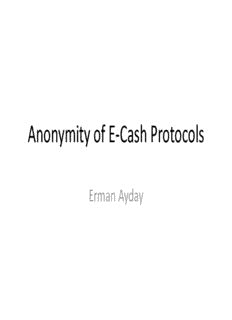
Anonymity of E-Cash Protocols PDF
Preview Anonymity of E-Cash Protocols
Anonymity of E-Cash Protocols Erman Ayday Disclaimer It is debatable that anonymous e-cash protocols are also useful for black market and money laundering 2 Bitcoin S. Nakamoto, 2008 • A software-based online payment system described by Satoshi Nakamoto • Decentralized digital currency: – Payments work peer-to-peer without a central repository or single administrator • Merchants have an incentive to accept the digital currency – Transaction fees are lower than credit cards – Some mainstream websites began accepting bitcoins • Payments are recorded in a public ledger (or blockchain) 3 Digital Wallet • Bitcoin uses public-key cryptography – Public key: an account number or name • Bitcoin address: H(public key) – Private key: ownership credentials • Wallet is a collection of these keys – Also generates these keys • Ownership of Bitcoins associated with a certain address is demonstrated with knowledge of the private key • If a private key is lost, the user cannot prove ownership • Risk of theft can be reduced by – Generating keys offline on an uncompromised computer – Saving the keys on external storage or paper printouts 4 Digital Wallet (Android) 5 Transactions • Permanently transfers ownership to a new address • Each owner transfers the coin to the next by digitally signing a hash of the previous transaction and the public key of the next owner • A payee can verify the signatures to verify the chain of ownership 6 Public Ledger – The Blockchain • Bitcoin servers can validate the transactions (mining), add them to their copy of the ledger, and then broadcast these ledger additions to other servers – Solution for preventing double-spends • Six times per hour, a group of accepted transactions (a block) is added to the blockchain 7 Blockchain (blockchain.info) 8 Mining • Maintaining the blockchain • Miners process payments by verifying each transaction and adding it to the blockchain • Individuals or companies engage in this activity in exchange for transaction fees and newly created bitcoins – Transaction fee is optional, but may speed up confirmation • Reward will be removed when an arbitrary limit of 21 million Bitcoins is reached (approximately in 2140) – There are roughly 13 million Bitcoins as of August 2014 • Recently became very competitive (specialized technology) 9 10 IEEE Spectrum
Description: